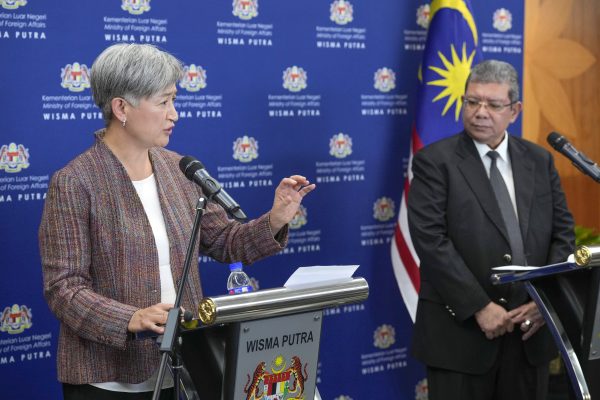Australian Foreign Minister Penny Wong reiterated that AUKUS would not be used to develop nuclear weapons for Australia. She stated that her country’s security treaties with the United Kingdom and the United States will not be used to develop nuclear weapons. See here.
She said this after meeting with the Malaysian’s counterpart Mr. Saifuddin Abdullah. It must be noted that, it is Ms. Wong’s first trip to Malaysia as Australia’s Foreign Minister.
She believed that worries about a regional weapons race would fade with time.
Ms. Wong made it clear that “her country, Australia, does not pose any nuclear threat as they do not have any weapons as such. Although she did accept the fact that there are some nuclear powers in that region, Australia does not belong to that group.”
Mr. Wong said that “she understands the havoc that the word “nuclear” causes and also the reactions of the people. However, here in Australia, we are dealing with nuclear propulsion, not nuclear weapons per se.”
Ms. Wong stated that “the incumbent Australian government is determined to ensure the region’s peace, stability, and prosperity. We remain quite clear that we do not seek, and will never seek, to arm our submarines with nuclear capabilities.”
Ms. Wong further added that during her visits to Vietnam and Indonesia, she explained Australia’s position to Saifuddin and her counterparts. We hope that, you know, people’s concerns will be alleviated over time.
However, Mr. Abdullah said that “his country’s reservations about the AUKUS treaty have not changed. He cautioned against a regional arms race but promised more substantial trade and cybersecurity collaboration with Australia.”
Saifuddin told reporters that he expressed Malaysia’s persistent concern about the security agreement between Australia, the United Kingdom, and the United States during a “very candid” meeting with Ms. Wong.
Almost immediately after Joe Biden, Boris Johnson, and Scott Morrison announced AUKUS, regional opposition to Australia’s proposed procurement of nuclear-powered submarines emerged.
AUKUS at a glance
In an effort to counter China, the United Kingdom, the United States, and Australia announced a historic security pact in the Asia-Pacific in 2021. It’s known as the AUKUS pact.
The three nations have agreed to strengthen the advancement of joint capabilities and technology sharing through the AUKUS alliance. Its goal is to promote greater integration of security and defence-related science, technology, industrial bases, and supply chains.
This would enable Australia to build a fleet of nuclear-powered submarines with the assistance of the United States and the United Kingdom. This action is expected to increase stability in the Indo-Pacific region.
Beijing has been accused of inflaming tensions in disputed areas such as the South China Sea in recent years.
Western countries have expressed concern about China’s infrastructure investment in the Pacific islands. They have also spoken out against China’s trade sanctions against countries such as Australia.
A joint virtual press conference was held to announce the new partnership. While China was not specifically mentioned, the three leaders made several references to regional security concerns that they said had “grown significantly.”
China, on the other hand, has called the alliance “extremely irresponsible.” Beijing claims that the Alliance jeopardizes regional peace and stability while escalating the arms race.
India, Indo-Pacific and AUKUS
The intangible threat imposed in the Indo-Pacific region continues to fragment India’s security experts, with little agreement on whether it benefits or adversely affects Indian interests.
Many experts think that the agreement will benefit India and its Indo-Pacific allies. AUKUS, according to its proponents, gives New Delhi more options in how to handle Beijing by adamantly stating its intention to deter China. Additionally, the agreement creates a space for closer strategic cooperation between France and India.
Indian officials are trying to be diplomatic when it comes to communicating a formal position on AUKUS. The imperative for New Delhi is to demonstrate cohesiveness with its allies, especially at a time when frictions with China are once again rising significantly.
Nonetheless, the security establishment in India is concerned about AUKUS. Despite the country’s solidarity with Canberra, there is a palpable fear that the new security treaty will have an impact on Indian interests in the Indian Ocean.













